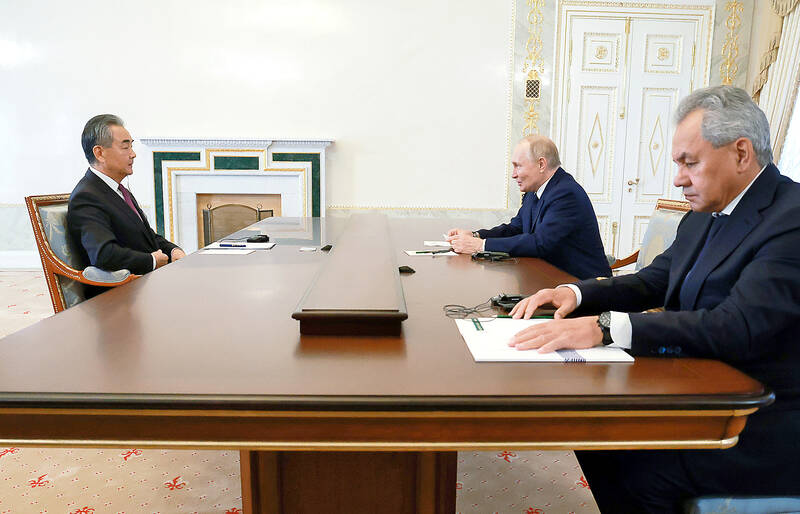Chinese President Xi Jinping (習近平) is to visit Russia next month for a summit of the BRICS bloc of developing economies, Chinese Minister of Foreign Affairs Wang Yi (王毅) said on Thursday, a move that comes as Moscow and Beijing seek to counter the West’s global influence.
Xi’s visit to Russia would be his second since the Kremlin sent troops into Ukraine in February 2022. China claims to take a neutral position in the conflict, but it has backed the Kremlin’s contentions that Russia’s action was provoked by the West, and it continues to supply key components needed by Moscow for weapons production.
Wang Yi met with Russian President Vladimir Putin in St Petersburg on Thursday and the two hailed ties between the two countries.

Photo: EPA-EFE
Wang said that Xi “happily accepted” Putin’s invite to attend the BRICS summit in the Russian city of Kazan next month.
Putin, in turn, announced that the two would also sit down for a bilateral meeting in Kazan and discuss various aspects of the Russia-China relations, which “are developing quite successfully” and “in all directions.”
Xi last visited Russia in March last year and Putin reciprocated with his own trip to China in October that year.
The two leaders have since also met in Beijing in May, where Putin took the first foreign trip of his fifth presidential term, and in Kazakhstan in July.
The BRICS alliance was founded in 2006 by Brazil, Russia, India and China, with South Africa joining in 2010.
It has recently undergone an expansion and now includes Iran, Egypt, Ethiopia and the United Arab Emirates.
Saudi Arabia has said it is considering joining, and Azerbaijan and Malaysia have formally applied.
BRICS has a stated aim to amplify the voice of major emerging economies to counterbalance the Western-led global order.
Its founding members have called for a fairer world order and the reform of international institutions like the UN, the International Monetary Fund and the World Bank.

‘UNUSUAL EVENT’: The Australian defense minister said that the Chinese navy task group was entitled to be where it was, but Australia would be watching it closely The Australian and New Zealand militaries were monitoring three Chinese warships moving unusually far south along Australia’s east coast on an unknown mission, officials said yesterday. The Australian government a week ago said that the warships had traveled through Southeast Asia and the Coral Sea, and were approaching northeast Australia. Australian Minister for Defence Richard Marles yesterday said that the Chinese ships — the Hengyang naval frigate, the Zunyi cruiser and the Weishanhu replenishment vessel — were “off the east coast of Australia.” Defense officials did not respond to a request for comment on a Financial Times report that the task group from

DEFENSE UPHEAVAL: Trump was also to remove the first woman to lead a military service, as well as the judge advocates general for the army, navy and air force US President Donald Trump on Friday fired the chairman of the Joint Chiefs of Staff, Air Force General C.Q. Brown, and pushed out five other admirals and generals in an unprecedented shake-up of US military leadership. Trump wrote in a post on Truth Social that he would nominate former lieutenant general Dan “Razin” Caine to succeed Brown, breaking with tradition by pulling someone out of retirement for the first time to become the top military officer. The president would also replace the head of the US Navy, a position held by Admiral Lisa Franchetti, the first woman to lead a military service,

Four decades after they were forced apart, US-raised Adamary Garcia and her birth mother on Saturday fell into each other’s arms at the airport in Santiago, Chile. Without speaking, they embraced tearfully: A rare reunification for one the thousands of Chileans taken from their mothers as babies and given up for adoption abroad. “The worst is over,” Edita Bizama, 64, said as she beheld her daughter for the first time since her birth 41 years ago. Garcia had flown to Santiago with four other women born in Chile and adopted in the US. Reports have estimated there were 20,000 such cases from 1950 to

CONFIDENT ON DEAL: ‘Ukraine wants a seat at the table, but wouldn’t the people of Ukraine have a say? It’s been a long time since an election, the US president said US President Donald Trump on Tuesday criticized Ukrainian President Volodymyr Zelenskiy and added that he was more confident of a deal to end the war after US-Russia talks. Trump increased pressure on Zelenskiy to hold elections and chided him for complaining about being frozen out of talks in Saudi Arabia. The US president also suggested that he could meet Russian President Vladimir Putin before the end of the month as Washington overhauls its stance toward Russia. “I’m very disappointed, I hear that they’re upset about not having a seat,” Trump told reporters at his Mar-a-Lago resort in Florida when asked about the Ukrainian